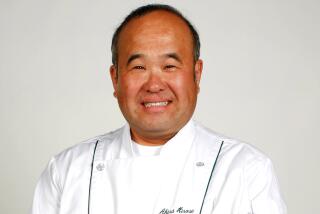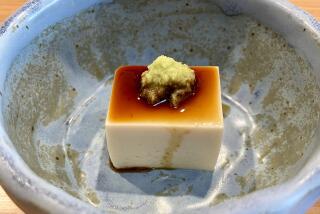Frances Hashimoto dies at 69; Little Tokyo leader, mochi ice cream creator
- Share via
Frances Hashimoto, one of Little Tokyo’s most influential business leaders who fought to preserve the neighborhood’s Japanese cultural traditions and who invented the popular fusion dessert known as mochi ice cream, died of lung cancer Sunday at her Pasadena home. She was 69.
Hashimoto was the feisty, visionary president of Mikawaya, the 102-year-old, three-generation family business selling traditional Japanese sweet pastries and snacks. At the urging of her widowed mother, she left teaching and took over the family business at age 27, vastly expanding its reach from a single shop in Little Tokyo to four retail stores in Southern California.
And she put her most famous invention — an ice cream ball in seven flavors covered in soft, sweet rice cake — into such mainstream markets as Trader Joe’s, Safeway, Albertsons and Ralphs.
PHOTOS: Notable deaths of 2012
Despite her business success, it was her leadership on myriad community organizations that made the biggest mark on Little Tokyo as it struggled through economic downturns and rapid demographic changes transforming the historic heart of Southern California’s Japanese American community.
Over four decades, Hashimoto served on the Little Tokyo Business Assn., Nisei Week Foundation, Japanese American Cultural & Community Center and various advisory committees overseeing the neighborhood’s redevelopment and transportation projects. Those who worked with her said she was unstintingly generous with financial contributions and donated platters of her sweet rice cakes, baked chestnut buns and other traditional desserts for community events.
“She is a historic and iconic figure,” said L.A. City Councilwoman Jan Perry, a close friend who worked with her on several Little Tokyo projects. “She worked very hard to protect the history, integrity and identity of Little Tokyo as the largest Japantown in California.”
Hashimoto fought to continue the community’s annual Nisei Week festival despite diminishing attendance, in large part because she strongly believed that younger Japanese Americans needed to connect with their heritage, according to Ellen Endo, former editor of the Rafu Shimpo, the Japanese American community newspaper.
Hashimoto also passionately promoted her culture. Perry said, for instance, that Hashimoto taught her Japanese folk dances at community festivals. And she made a point to welcome new non-Japanese merchants to Little Tokyo with gentle reminders to respect the neighborhood’s cultural heritage, said the Rev. Noriaki Ito of Higashi Honganji Buddhist Temple.
As an advisory board member to the city’s former redevelopment agency, Hashimoto “had a hand in everything they did in Little Tokyo — housing projects, security patrols, signage,” said Bill Watanabe, the Little Tokyo Service Center’s recently retired executive director.
The bilingual Hashimoto also promoted the sister-city relationship between Los Angeles and Nagoya, bringing the Nisei Week queen and princesses to the Japanese city every year. This spring, the Japanese government honored her with its prestigious decoration, the Order of the Rising Sun, Gold and Silver Rays.
“She’s probably made as big of a difference as anyone I can think of in Little Tokyo,” Ito said.
Hashimoto was born Aug. 26, 1943, in a World War II internment camp in Poston, Ariz. She grew up in Boyle Heights and graduated from USC. Endo, who attended Hollenbeck Middle School with her, recalled Hashimoto was a strong-willed risk taker even then — flouting school rules to wear long, painted nails.
She had been teaching for four years when her mother appealed to her to help run the family business in 1970.
“I was teaching third grade, and my mother wanted me to give it up,” she said in a 1978 interview with The Times. “It took me six months to decide, but what do you do with a business your family has had for 50 years?”
This month, Hashimoto’s contributions will be memorialized when the plaza at 2nd and Azusa streets in Little Tokyo is renamed for her. The motion for the Frances Hashimoto Plaza was introduced by Perry and approved by the City Council in September.
Hashimoto is survived by her husband, Joel Friedman; and two sons, Bryan Koji and Ryan Koroku Hashimoto-Friedman, and her sister, June Sachiko Osugi.
A funeral will be held at 10 a.m. Saturday at the Japan America Theatre, 244 S. San Pedro St.
More to Read
Start your day right
Sign up for Essential California for the L.A. Times biggest news, features and recommendations in your inbox six days a week.
You may occasionally receive promotional content from the Los Angeles Times.




















































